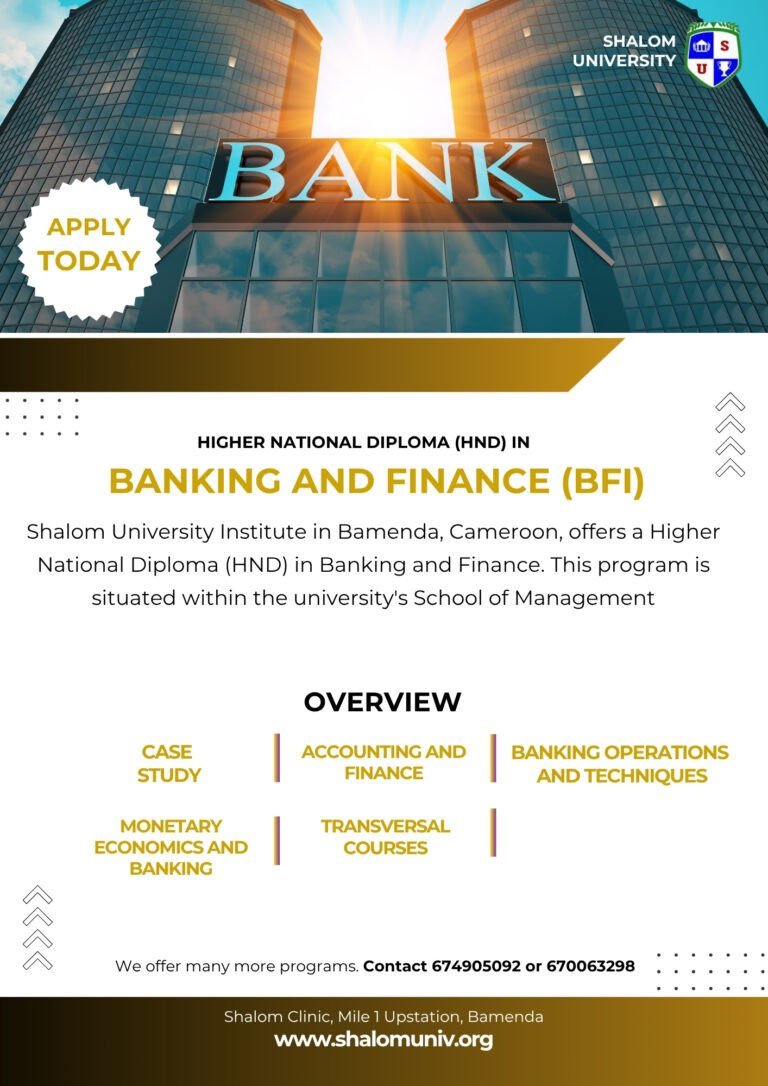In the bustling economy of Cameroon, meticulous financial management is the bedrock of success for businesses, organizations, and governmental bodies. The demand for well-trained accounting professionals capable of navigating the intricacies of financial reporting, taxation, and cost management is ever-present. Shalom University in Bamenda stands out by offering a Higher National Diploma (HND) in Accountancy, a program specifically designed to equip students with the essential skills and knowledge required to thrive in Cameroon’s financial sector.
The HND in Accountancy at Shalom University focuses on practical application, ensuring graduates are not only familiar with accounting principles but also proficient in using modern tools and applying their knowledge within the specific legal and economic context of Cameroon. The curriculum is tailored to develop professionals who are analytical, ethical, and ready to contribute meaningfully to any organization they join.
The ACC Curriculum at Shalom University
The HND in Accountancy program at Shalom University is anchored by a set of core papers that provide a comprehensive and practical education in the field.
Paper: Case Study
The Case Study paper is a vital component that integrates all the theoretical knowledge and technical skills gained throughout the program. It challenges students to analyze complex business scenarios, from initial diagnosis to solution planning and strategic advice. This is particularly relevant for accountants in Cameroon, who may need to work with businesses facing unique challenges related to market dynamics, regulations, and resource allocation.
The course trains students to:
- Analyze real-world business problems: Based on a given case, students must evaluate the financial health and operational efficiency of a hypothetical or real company.
- Identify accounting and financial issues: Students pinpoint specific problems related to financial reporting, taxation, cost control, or internal processes.
- Propose evidence-based solutions: They formulate practical recommendations based on accounting principles, relevant Cameroonian tax laws, and management strategies. For example, a case study might involve analyzing a company’s declining profitability and proposing cost-cutting measures or revenue optimization strategies within the local economic context.
- Defend their decisions: During formal presentations, students must justify their analysis and proposed solutions, demonstrating their critical thinking and communication skills.
Paper: Computer Assisted Accounting
In today’s digital world, accounting goes hand-in-hand with technology. This paper ensures that students are not just familiar with accounting theory but are also proficient in using the digital tools that streamline accounting processes in businesses across Cameroon. This practical skill set makes graduates immediately valuable in the job market.
Key topics include:
- Accounting Software Proficiency: Hands-on training with popular accounting software packages relevant to the Cameroonian market (e.g., SAGE, QuickBooks, or similar local equivalents). Students learn to manage ledgers, generate financial statements, and track transactions digitally.
- Spreadsheet Applications: Advanced use of spreadsheet software like Microsoft Excel for financial analysis, budgeting, forecasting, and data presentation.
- Database Management: Introduction to basic database concepts relevant to managing large volumes of financial data.
- Data Security and Integrity: Understanding the importance of protecting financial data and maintaining its accuracy and confidentiality, crucial for trust in business operations.
Paper: Tax Accounting
Taxation is a complex and constantly evolving area, and expertise in tax accounting is highly sought after by businesses and individuals alike. This paper provides students with a detailed understanding of the Cameroonian tax system, enabling them to ensure compliance and optimize tax liabilities.
The curriculum covers:
- Cameroonian Tax Laws: In-depth study of the legal framework governing taxation in Cameroon, including corporate tax, income tax, VAT (Value Added Tax), and other local taxes according to the Cameroon General Tax Code.
- Tax Planning and Compliance: Strategies for minimizing tax burdens legally while ensuring adherence to all tax regulations.
- Tax Calculation and Filing: Practical application of tax rules to calculate various taxes and prepare tax returns for different types of entities (individuals, companies, partnerships).
- Tax Audits and Appeals: Understanding the process of tax audits and the procedures for appealing tax decisions, which is important for protecting client interests.
Paper: Cost and Management Accounting
Beyond simply reporting financial results, businesses need to understand their costs to make informed strategic decisions. This paper focuses on providing managers with the financial information necessary for planning, controlling, and decision-making within the organization. This is particularly crucial for Cameroonian businesses aiming to compete effectively in local and international markets.
Key areas of focus include:
- Costing Methods: Various methods for determining the cost of products, services, and projects, including job costing, process costing, and activity-based costing.
- Budgeting and Forecasting: Developing and using budgets as tools for planning, performance evaluation, and resource allocation.
- Variance Analysis: Analyzing the differences between actual and budgeted costs to identify areas for improvement and control.
- Decision Making Tools: Using cost accounting information to make crucial business decisions, such as pricing products, accepting special orders, or discontinuing product lines.
- Performance Measurement: Developing key performance indicators (KPIs) to evaluate the efficiency and effectiveness of different parts of an organization.
Building a Foundation for Financial Stewardship
Graduates of the HND in Accountancy from Shalom University are well-prepared to enter the workforce in various capacities. They can serve as accounting assistants, bookkeepers, tax preparers, cost accountants, or auditors in both public and private sectors within Cameroon. Their proficiency in Computer Assisted Accounting, coupled with a deep understanding of Cameroonian Tax Accounting and Cost & Management Accounting, makes them highly sought-after candidates. The Case Study paper ensures that they are not just technically skilled but also adept at applying their knowledge to solve real business problems and contribute strategically. By providing a practical and contextually relevant education, Shalom University plays a significant role in nurturing the financial expertise crucial for the sustainable economic development of Cameroon.


